News
Navigating market volatility: what do Trump’s tariffs mean for long term investors?
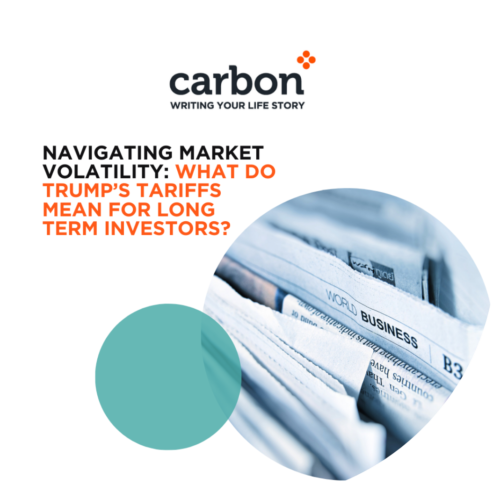
In times of market volatility, particularly in response to geopolitical developments such as wars, or tariff impositions, it’s normal for investors to feel uncertain. Last weeks ‘Liberation Day’ announcement by the Trump administration has created significant fluctuations in the stock market. But what does this new round of global tariffs on goods entering the United States and the response from other countries mean for your portfolio?
In this blog post, we’ll walk you through why, despite short-term volatility, maintaining a long-term investment perspective is not only rational, but is the only sure-fire way of long-term success.
The historical perspective
A review of history provides a crucial context for understanding the current market environment. Tariffs and trade wars have happened before, and while they do create short-term volatility, they do not dictate the long-term direction of markets.
Take, for example, the U.S.-China trade war that began in earnest in 2018. Despite significant fluctuations in the stock market during this period, the S&P 500 posted gains in the years that followed. While tariffs caused disruption, they were not enough to derail the broader economic fundamentals that drive long-term market performance.
This is shown time and again when we look back historically, it doesn’t matter what is going on in markets short term, over the long-term markets will recover and continue their march upwards.
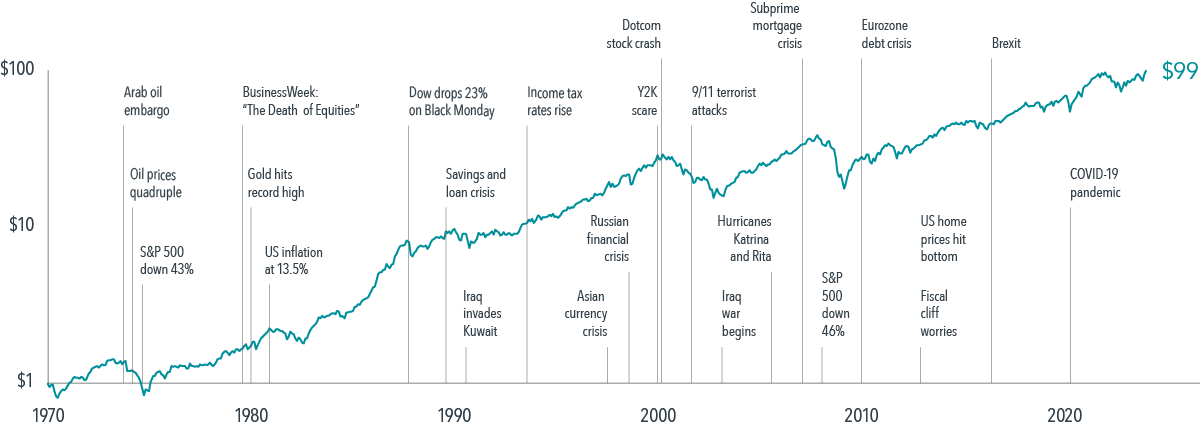
Source: Dimensional, 2024 - Growth of a Dollar—MSCI World Index (Net Dividends)
Furthermore, research has shown that markets often recover from geopolitical or policy shocks faster than many expect. According to data from Vanguard, global equities tend to recover within 6 to 12 months after major geopolitical events, even if those events lead to significant market corrections.
During Covid, markets lost around one-third of their value in the first three months then recovered before year end, in a time that felt much more uncertain that this current time of market volatility. During the 2008/09 crisis, equities were down around 40% and, although they took longer to recover, bounced back eventually. Below is how long each of the most recent temporary market declines (bear markets) took to recover:
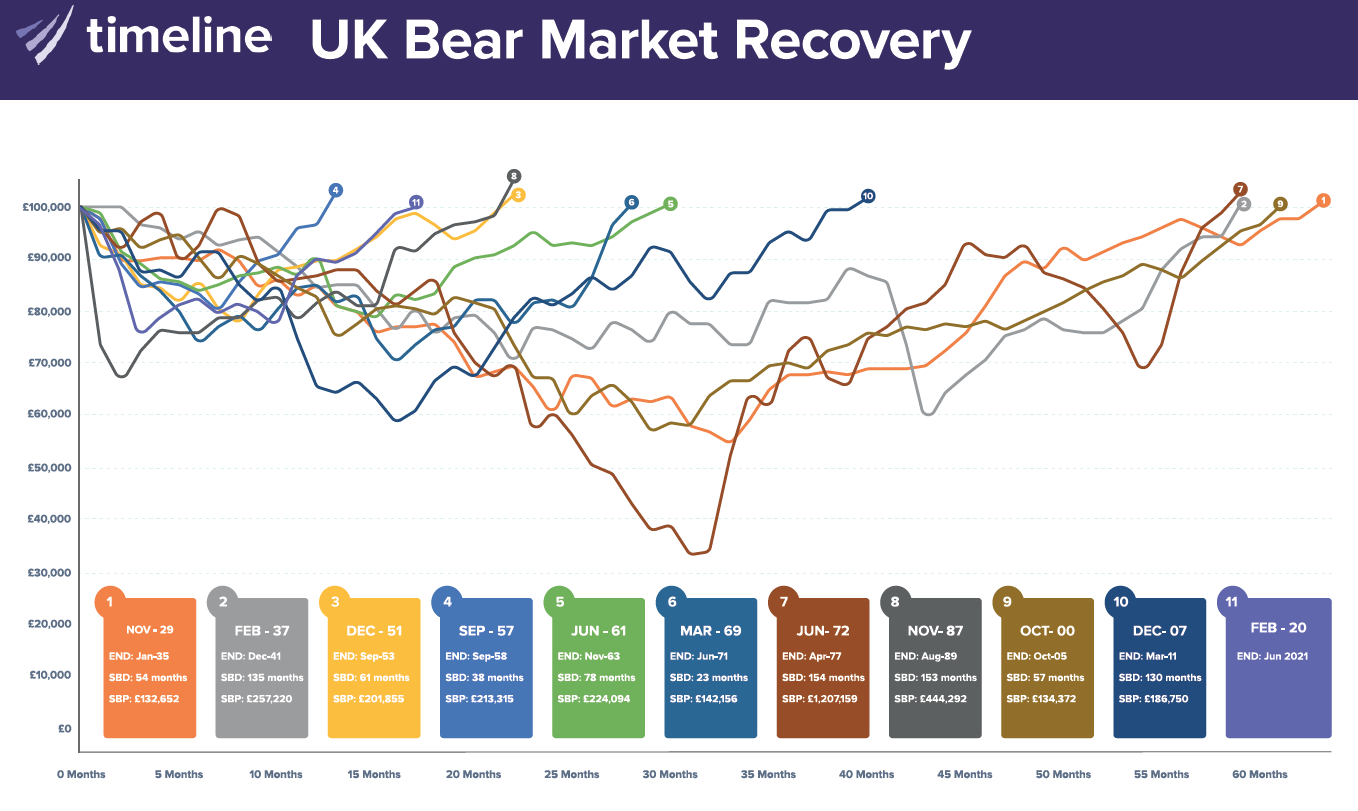
Source: Timeline Limited using data from Morningstar. Copyright © 2024. Timeline Limited. All rights reserved.
We know from history that market declines are temporary, the long-term advance of capital markets is permanent. This graph shows bull markets in blue whereby markets are rising with the bear market downturns in red. Volatility needs to work both ways, you are rewarded by living through the market downturns and staying in the market to be part of the recovery into the blue market climbs.
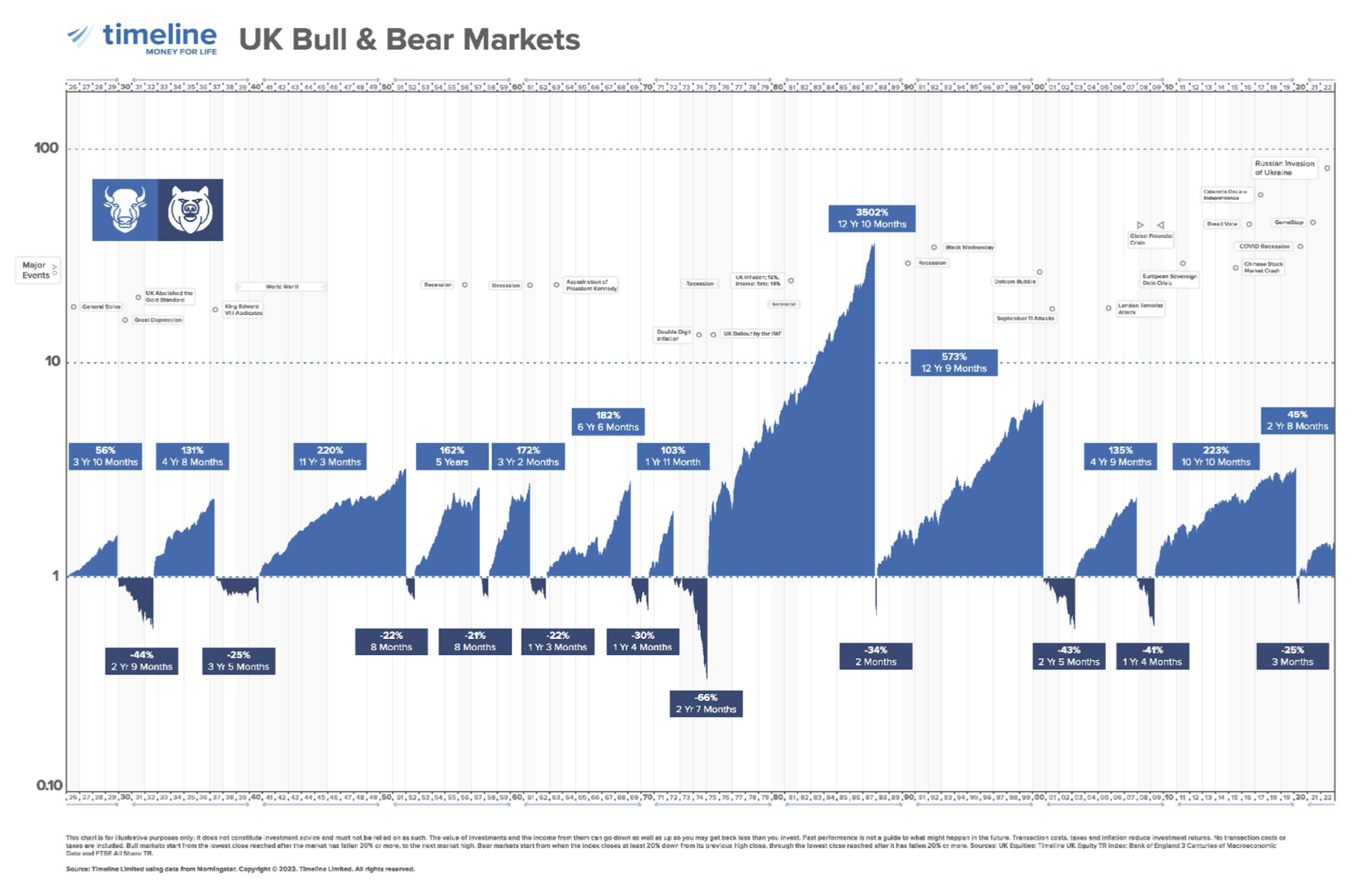
Source: Timeline Limited using data from Morningstar. Copyright © 2024. Timeline Limited. All rights reserved.
Staying the course: the power of long-term investing
The best way to limit the impact of short-term volatility in markets is to have a long-term investment strategy supported by diversification, tailored risk tolerance and an evidence-based investment approach. The key to weathering short-term volatility is not to react impulsively to headlines or fear-driven market movements, but rather to focus on your long-term financial goals and stick to a disciplined investment strategy. That way, you will take part in both the best and worst days of the market, in the knowledge there are more good days than bad. Missing out on best days of the market by timing in and out of your strategy is catastrophic for your returns long term.
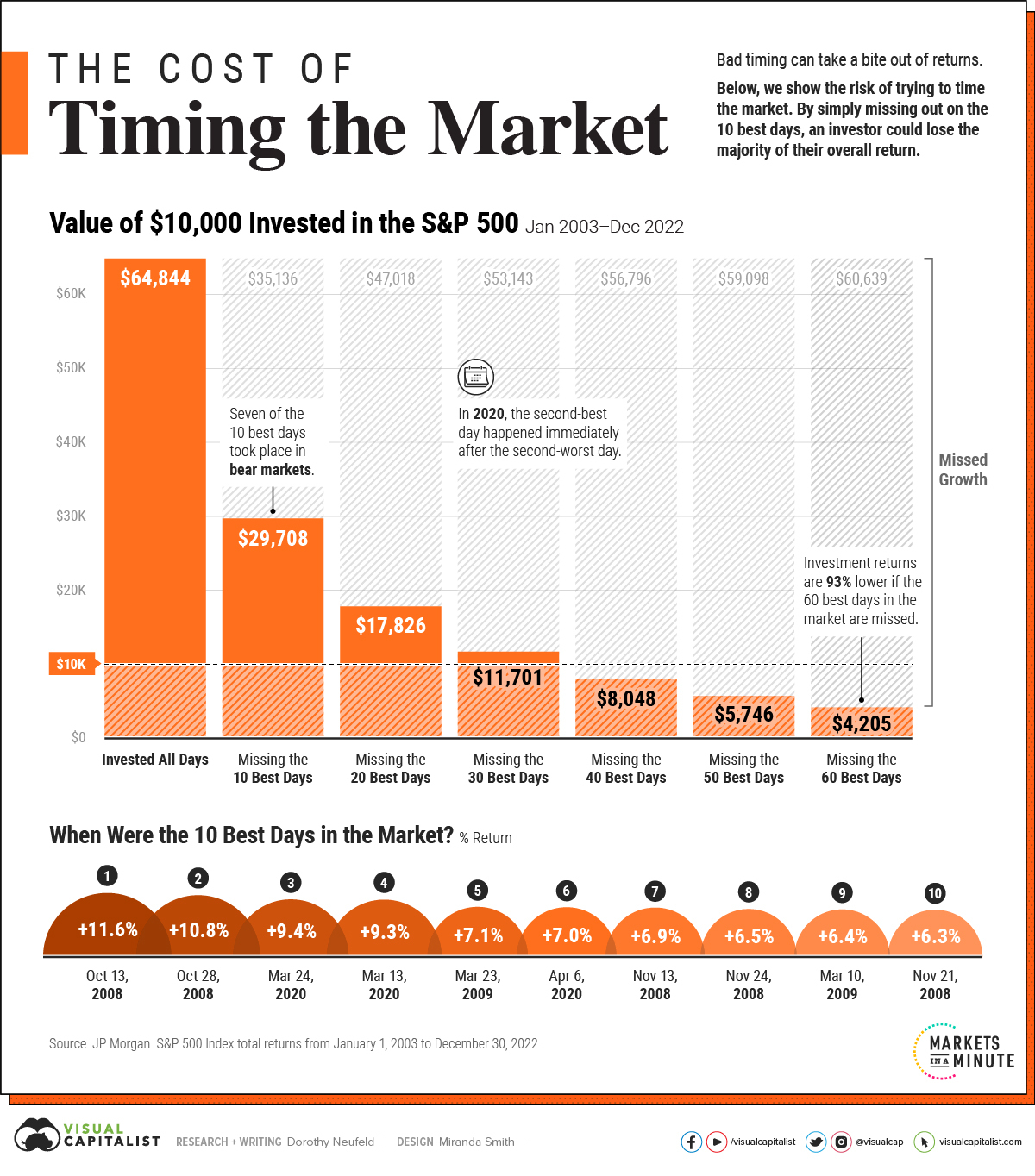
Diversification
By diversifying your investments across different asset classes, industries, and geographical regions, you reduce the potential impact of any single event, like tariffs, on your overall portfolio. A diversified portfolio can help smooth out the bumps created by short-term volatility.
Tailored risk tolerance
Your investment strategy should reflect your individual risk tolerance and time horizon as well as what your financial plan needs from your investment. Holding a cash buffer for short term spending allows you to have a long-term investment horizon. This means that you can ride out periods of volatility like we are seeing. Even if you must draw some money from your portfolio, often it is a small proportion of the overall pot which means the rest remains invested long term.
Evidence-based investment
We rely on Nobel prize winning, systematic research and data to guide our decisions, not on the latest headlines or emotions. Markets are forward-looking, and over the long term, they reflect underlying economic growth, productivity improvements, and innovation. Historical evidence shows that short-term shocks are often followed by recovery as markets adapt and evolve. As such, reacting to tariff news with drastic portfolio changes often proves to be counterproductive. On the flip side, those that do react to the latest headlines and news may get some decisions right but on average will not get enough right to justify their costs. This ties in with the academic evidence shows you cannot predict the market with any certainty over a reasonable period.
Conclusion: maintain perspective
Our response is to make a pro-active decision to sit tight, stick with your existing investment strategy and wait for the markets to recover. This is simple, but not easy to do. However, we know it is the best strategy having studied masses of world-leading, academic papers spanning multiple decades and having supported clients through numerous market crashes. Making changes and having emotional, short-term responses to market turmoil is a sure-fire way to eroding long term return. By remaining invested throughout, you will benefit from the market recovery as and when it happens.
At Carbon Financial Partners, we are committed to guiding our clients through the ups and downs of the market. Our response to sit tight is not ‘doing nothing’ and doesn’t ‘lack proactivity’ because most of the hard work has been done by the evidence we use to build our investment approach. Making changes and having emotional, short-term responses to market turmoil is a sure-fire way to erode value.
Please reach out to your financial planner or enquiries@carbonfinancial.co.uk should you wish to discuss the current events further.
The value of investments and the income derived from them can fall as well as rise. You may not get back what you invest.
This communication is for general information only and is not intended to be individual advice. It represents our understanding of law and HM Revenue & Customs practice. You are recommended to seek competent professional advice before taking any action. Tax and Estate Planning Services are not regulated by the Financial Conduct Authority. Tax treatment depends on the individual circumstances of each client and may be subject to change in the future.

Sign-up for our Carbon Catch-Up Newsletter
Part of The Progeny Group
Progeny is independent financial planning, investment management, tax services, property, HR and legal counsel, all in one place.
Carbon Financial Partners, part of The Progeny Group, is a trading name of Carbon Financial Partners Limited which is authorised and regulated by the Financial Conduct Authority under reference 536900.
Carbon Financial Partners Limited is registered in Scotland. Company registration number SC386400. Registered Address: 61 Manor Place, Edinburgh, EH3 7EG. Carbon Financial Partners Limited is part of The Progeny Group Limited.
© Carbon Financial Partners 2025
www.financial-ombudsman.org.uk
Client Account | Personal Finance Portal | Privacy Notice | Cookies | Careers
